Intro
Learn about Amlodipine Besylate 10 Mg, a calcium channel blocker treating hypertension, angina, and coronary artery disease, with benefits, side effects, and interactions, managing blood pressure and cardiovascular health.
Amlodipine besylate 10 mg is a medication that belongs to a class of drugs known as calcium channel blockers. It is primarily used to treat high blood pressure and chest pain, also known as angina. The medication works by relaxing the blood vessels, which allows blood to flow more easily and reduces the heart's workload. This can help to lower blood pressure and increase the supply of oxygen to the heart, reducing the risk of heart attack and stroke.
The importance of managing high blood pressure cannot be overstated. Hypertension is a major risk factor for cardiovascular disease, which is the leading cause of death worldwide. If left untreated, high blood pressure can lead to serious health problems, including heart failure, kidney disease, and vision loss. Amlodipine besylate 10 mg is an effective treatment option for high blood pressure, and it has been shown to be safe and well-tolerated in a wide range of patients.
In addition to its use in treating high blood pressure, amlodipine besylate 10 mg is also used to treat angina. Angina is a type of chest pain that occurs when the heart muscle does not receive enough oxygen-rich blood. This can be a symptom of coronary artery disease, which is a condition in which the arteries that supply blood to the heart become narrowed or blocked. Amlodipine besylate 10 mg can help to reduce the frequency and severity of angina attacks, improving quality of life for patients with this condition.
Amlodipine Besylate 10 Mg Mechanism of Action
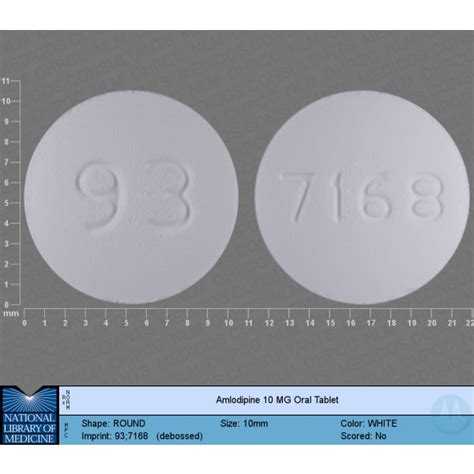
The mechanism of action of amlodipine besylate 10 mg is complex and involves multiple pathways. The medication binds to dihydropyridine receptors in the smooth muscle cells of the blood vessels, which blocks the entry of calcium ions. This causes the blood vessels to relax and dilate, reducing peripheral resistance and lowering blood pressure. The medication also has a negative inotropic effect, which means that it reduces the contractility of the heart muscle. This can help to reduce the heart's workload and improve cardiac output.
Benefits of Amlodipine Besylate 10 Mg
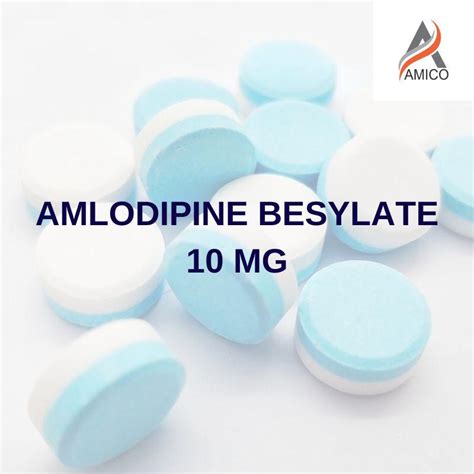
In addition to its cardiovascular benefits, amlodipine besylate 10 mg may also have benefits for patients with other health conditions. For example, the medication has been shown to reduce the risk of kidney disease in patients with hypertension. It may also have benefits for patients with diabetes, as it can help to reduce the risk of cardiovascular complications.
Common Benefits of Amlodipine Besylate 10 Mg
Some of the common benefits of amlodipine besylate 10 mg include: * Lowering blood pressure and reducing the risk of heart attack and stroke * Reducing the frequency and severity of angina attacks * Improving cardiac output and reducing the heart's workload * Reducing the risk of kidney disease and cardiovascular complications in patients with diabetes * Being well-tolerated and having a low risk of side effectsAmlodipine Besylate 10 Mg Side Effects

In rare cases, amlodipine besylate 10 mg can cause more serious side effects. These may include:
- Allergic reactions, such as hives, itching, and difficulty breathing
- Swelling of the face, lips, tongue, or throat
- Chest pain or shortness of breath
- Abnormal heart rhythms
- Increased risk of bleeding or bruising
Managing Side Effects of Amlodipine Besylate 10 Mg
If you experience any side effects while taking amlodipine besylate 10 mg, it is essential to talk to your doctor. They can help you to manage your symptoms and adjust your treatment plan as needed. In some cases, your doctor may recommend a different medication or dosage to minimize side effects.Amlodipine Besylate 10 Mg Dosage and Administration
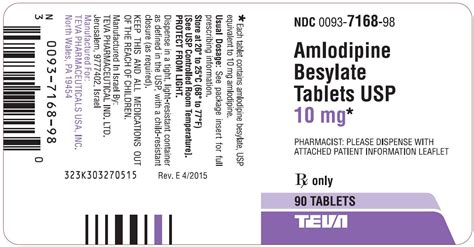
It is essential to take amlodipine besylate 10 mg exactly as directed by your doctor. The medication should be taken at the same time every day, with or without food. Do not crush, chew, or break the tablets, as this can affect the way the medication is absorbed.
Special Considerations for Amlodipine Besylate 10 Mg Dosage
Some patients may require special consideration when taking amlodipine besylate 10 mg. For example: * Patients with liver or kidney disease may require a lower dose or more frequent monitoring. * Patients with heart failure may require a lower dose or more frequent monitoring. * Patients taking other medications may require a lower dose or more frequent monitoring to avoid interactions.Amlodipine Besylate 10 Mg Interactions
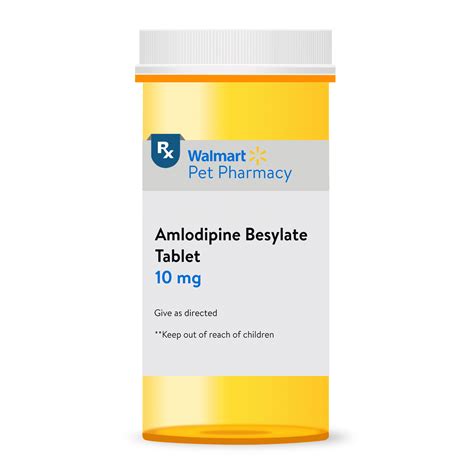
It is essential to talk to your doctor about any medications you are taking before starting amlodipine besylate 10 mg. They can help you to identify potential interactions and adjust your treatment plan as needed.
Managing Interactions with Amlodipine Besylate 10 Mg
If you experience any interactions while taking amlodipine besylate 10 mg, it is crucial to talk to your doctor. They can help you to manage your symptoms and adjust your treatment plan as needed. In some cases, your doctor may recommend a different medication or dosage to minimize interactions.Amlodipine Besylate 10 Mg Warnings and Precautions
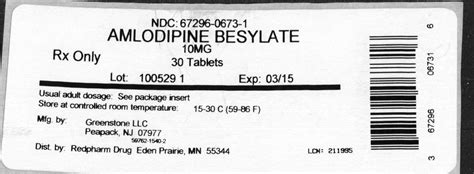
It is essential to talk to your doctor about any concerns or questions you have before starting amlodipine besylate 10 mg. They can help you to understand the potential risks and benefits and make an informed decision about your treatment.
Special Warnings and Precautions for Amlodipine Besylate 10 Mg
Some patients may require special warnings and precautions when taking amlodipine besylate 10 mg. For example: * Patients with a history of heart failure may require more frequent monitoring. * Patients with a history of liver or kidney disease may require a lower dose or more frequent monitoring. * Patients taking other medications may require a lower dose or more frequent monitoring to avoid interactions.What is amlodipine besylate 10 mg used for?
+Amlodipine besylate 10 mg is used to treat high blood pressure and chest pain, also known as angina.
How does amlodipine besylate 10 mg work?
+Amlodipine besylate 10 mg works by blocking the entry of calcium into the muscle cells of the heart and blood vessels, causing the blood vessels to relax and widen.
What are the common side effects of amlodipine besylate 10 mg?
+The common side effects of amlodipine besylate 10 mg include headache, dizziness, fatigue, nausea, and abdominal pain.
Can I take amlodipine besylate 10 mg with other medications?
+Amlodipine besylate 10 mg can interact with other medications, so it is essential to talk to your doctor about any medications you are taking before starting amlodipine besylate 10 mg.
What are the warnings and precautions for amlodipine besylate 10 mg?
+Amlodipine besylate 10 mg can cause dizziness and lightheadedness, and it can increase the risk of bleeding or bruising, especially in patients taking anticoagulant medications.
We hope this article has provided you with a comprehensive understanding of amlodipine besylate 10 mg, its benefits, side effects, and interactions. If you have any further questions or concerns, please do not hesitate to comment below or share this article with your friends and family. Remember to always consult with your doctor before starting any new medication, and to follow their instructions carefully to ensure your safety and well-being. By working together, we can help to improve our health and reduce the risk of cardiovascular disease.
